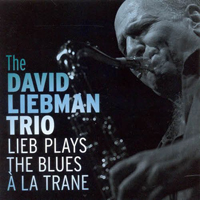Home » Jazz Articles » Album Review » The David Liebman Trio: Lieb Plays the Blues a la Trane
The David Liebman Trio: Lieb Plays the Blues a la Trane
On Lieb Plays the Blues á la Trane, he burns with a discernible zeal for the blues, making the emotions of the deep blues all his own, with majestic storytelling. There is wailing, as well as the mercurial whoop for joy. Few can conjure the spirit of the blues like Liebman, because few artists have paid their dues and triumphed over human adversity the way the saxophonist has. Thus, there is a certain honesty; a deep sincerity in the manner of his playing. Liebman's playing—like Trane's—is the cry of a soul twisting and turning, as it negotiates life's travails. His caterwauling ululations on "Village Blues" is the most breathtaking sweep of emotions that might be heard on soprano saxophone for some time to come.
It is clearly Liebman's attempt to showcase the blues with Coltrane's feeling and fervor, thereby keeping the spirit of the musician alive. This he succeeds in doing by devoting his efforts to a sort of metaphysical (rather than musical) aspect of the blues. He does, however, translate metaphysics into music, in much the same way that poets like John Donne and Andrew Marvell did centuries ago. Liebman is actually an ancient soul who has spent a lifetime in pursuit of the purity of experience through music. And it is this aspect of his artistry that makes him a kindred spirit to Coltrane, rather than the mundane similarities of playing the soprano and tenor saxophones.
For good measure, Liebman also adds some classic blues charts to this outing. For instance, there is Miles Davis' "All Blues," and Coltrane's mighty soulful drama, "Up Against the Wall," which is so fraught with dynamic tension that it is almost crystalline in tone and manner. For relief, there are "Mr. P.C.," Trane's tribute to bassist, Paul Chambers and "Take the Coltrane," a wonderful chart that Duke Ellington wrote for his classic date with Coltrane. All are examples which feature ingenious twists and turns at the hands of Liebman on this album of mighty blues.
Track Listing
All Blues; Up Against the Wall; Mr. P.C.; Village Blues; Take the Coltrane.
Personnel
David Liebman: soprano, tenor saxophones; Marius Beets: bass; Eric Ineke: drums.
Album information
Title: Lieb Plays the Blues a la Trane | Year Released: 2011 | Record Label: Challenge Records
< Previous
The Way We Walk
Next >
ECM 1970s: Part 2
Comments
Tags
The David Liebman Trio
CD/LP/Track Review
Raul D'Gama Rose
Braithwaite & Katz Communications
Challenge Records
United States
John Coltrane
Miles Davis
Paul Chambers
duke ellington
Lieb Plays The Blues A La Trane
For the Love of Jazz
 All About Jazz has been a pillar of jazz since 1995, championing it as an art form and, more importantly, supporting the musicians who create it. Our enduring commitment has made "AAJ" one of the most culturally important websites of its kind, read by hundreds of thousands of fans, musicians and industry figures every month.
All About Jazz has been a pillar of jazz since 1995, championing it as an art form and, more importantly, supporting the musicians who create it. Our enduring commitment has made "AAJ" one of the most culturally important websites of its kind, read by hundreds of thousands of fans, musicians and industry figures every month.



















